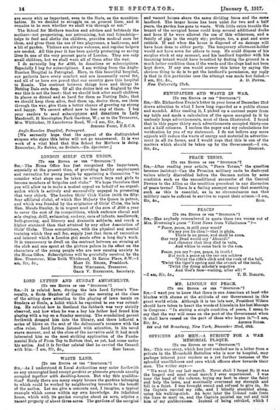WASTE LAND.
[To THE EDITOR 07 THE " SPECTATOR.") Sra,—As I understand it Local Authorities may enter forthwith on any unoccupied land except gardens or pleasure grounds usually occupied together with dwelling-houses. But why this qualifica- tion? Surely there are many empty houses the gardens belonging to which could be worked by neighbouring tenants to the benefit of the nation. Let me give a concrete and, I imagine, a typical example which comes within my own knowledge. An inhabited house, which with its garden occupies about an acre, adjoins a vacant property of about three acres. The gardens of the occupied and vacant houses share the same dividing fence and the same landlord. The larger house has been unlet for two and a half years, the garden has gone to waste. With little extra trouble the tenant of the occupied house could keep several additional ducks and hens if he were allowed the use of this wilderness, and a family of pigs in the empty sty; perhaps, too, a goat and some rabbith. If and when the house is disposed of no damage will have been done to either party. The temporary allotment-holder would not have sown for others to reap. Ile could dispose of his surplus stock at any moment, and his landlord together with his incoming tenant would have benefited by finding the ground in a much better condition than if the weeds and the slugs had not been kept down. If any one would answer this letter by saying the obvious thing to do is to get the landlord's permission, my reply is that in this particular case the attempt was made but failed.-










































 Previous page
Previous page